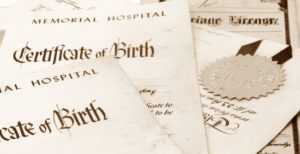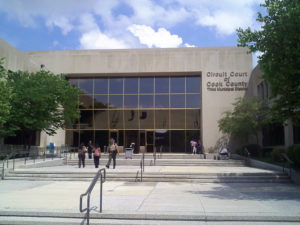Changes in the Cook County Domestic Relations Courts
The Cook County court recently took bold steps to modernize the Domestic Relations Division and improve the system for all families moving through the divorce, paternity and child support process. Consolidation of the divorce court and parentage court went into effect on February 6, 2017 and is the culmination of many years work by a task force convened by Presiding Judge Grace Dickler.
 In 2014, Chicago Appleseed completed a constitutionality analysis of the division which concluded that maintaining a separate divorce court and parentage court resulted in inequitable treatment to couples seeking child support, based on their marital status. This system—enabled by the Bastardy Act of 1845—left unmarried couples, who were often lower income or people of color, in a separate and arguably unequal court.
In 2014, Chicago Appleseed completed a constitutionality analysis of the division which concluded that maintaining a separate divorce court and parentage court resulted in inequitable treatment to couples seeking child support, based on their marital status. This system—enabled by the Bastardy Act of 1845—left unmarried couples, who were often lower income or people of color, in a separate and arguably unequal court.
Upon receiving our report, Presiding Judge Dickler made a commitment to consolidate and assembled a task force of court staff, practitioners and other experts, with our affiliate, the Chicago Council of Lawyers, represented on the task force.. The Court worked with the Clerk’s Office on the logistics necessary to make the consolidation work and Chicago Appleseed worked as a pro bono consultant in the process. Together, Chicago Appleseed and Chicago Council of Lawyers worked with the Court to bring about the consolidation and to better utilize the administrative hearing officers.
Although consolidation of the division is now complete, as with any major change in the court system, there are still adjustments to be made, particularly in the case assignment process. We are confident that these issues will be resolved soon. The overall result, however, is that we now have a constitutional process that gives equal treatment to all persons.
In conjunction with consolidation, the court sought—and received—funding from the County to expand the Hearing Officer program, aimed at assisting unrepresented litigants and relieving the burdens on overcrowded courts. The response to that expansion is positive and shows how the court can move forward to meet the needs of both litigants and justice.
With the proposed consolidation of the Domestic Relations courts and on-going budget crisis, in July 2016, the Department of Health and Family Services, which is responsible for allocating and administering the IV-D reimbursement funds in Illinois, chose to discontinue reimbursing the hearing officer program in Domestic Relations. Many stakeholders and advocates, including Chicago Appleseed, felt that was short-sighted. We had been advocating for expansion of the hearing officer program in conjunction with consolidation and felt that discontinuation of the program would further complicate consolidation while depriving pro se litigants of a valuable resource.
Therefore, Chicago Appleseed supported the court in securing County funding to continue the hearing officer program. Arguing in favor, we noted that without hearing officers, the caseload placed upon judges would be unprecedented and extremely burdensome. The county judges simply do not have the capacity to assume the reportedly 5,000 annual cases historically handled by hearing officers. By funding hearing officers, the County would increase efficiency in how the cases are handled within its court system while ensuring through appropriate child support orders that County residents have the resources they need to effectively raise their families.
We argued that the impact of hearing officers had been dramatically undervalued both quantitatively—through inadequate data—and qualitatively—by misunderstandings about the program. Hearing officers present parents a less intimidating environment to explore their differences before seeing a judge. A hearing officer may assess that a case is ripe for mediation or a facilitated order and refer the parents to those services, reserving judicial time for more complex or contentious cases. Alternatively, the hearing officer may see that the parents are almost in agreement and then both recommend a child support order and assist the parties to develop a parenting time plan. Again, this preserves judicial resources for complex matters, but it also promotes parental cooperation through a collaborative, rather than adversarial, court process.
 Because the hearing officers historically handled around 5,000 cases annually in the Daly Center alone, removing them completely from the courts would have created a significant burden on the judges in the division. Thanks to the County Board’s decision to fund the hearing officer program in the absence of federal reimbursement dollars, the Court avoided adding stress to an already busy court system.
Because the hearing officers historically handled around 5,000 cases annually in the Daly Center alone, removing them completely from the courts would have created a significant burden on the judges in the division. Thanks to the County Board’s decision to fund the hearing officer program in the absence of federal reimbursement dollars, the Court avoided adding stress to an already busy court system.
Since consolidation—and since County funding for the hearing officers—beginning in March 2017, the hearing officers have starting handling cases in the suburban Cook County courthouses as well. Unlike the Daley Center, which has nearly 40 judges in the Domestic Relations Division, the courthouses in Markham and Rolling Meadows each have two Domestic Relations judges, while the courthouses in Bridgeview, Maywood and Skokie have only one each. Sending the hearing officers to those courthouses greatly relieves the pressure on those courtrooms and assists the substantial numbers of parents unrepresented by legal counsel. Four hearing officers are now assigned to the suburban courts in to Maywood and Markham, which had the greatest need for their assistance.
The program, however, provides more than assistance to the judges; it also relieves pressure on the parents by creating an alternate process. Families whose needs can be resolved through the hearing officer process save time and make fewer return trips to the courthouse. Response to the hearing officers in Maywood and Markham has been overwhelmingly positive.
The consolidation and the new hearing officer process is a credit to Presiding Judge Dickler and her staff. Chicago Appleseed and the program advisory committee of Chicago Appleseed and the Chicago Council of Lawyers are monitoring these reform efforts and intend to report on their progress.
